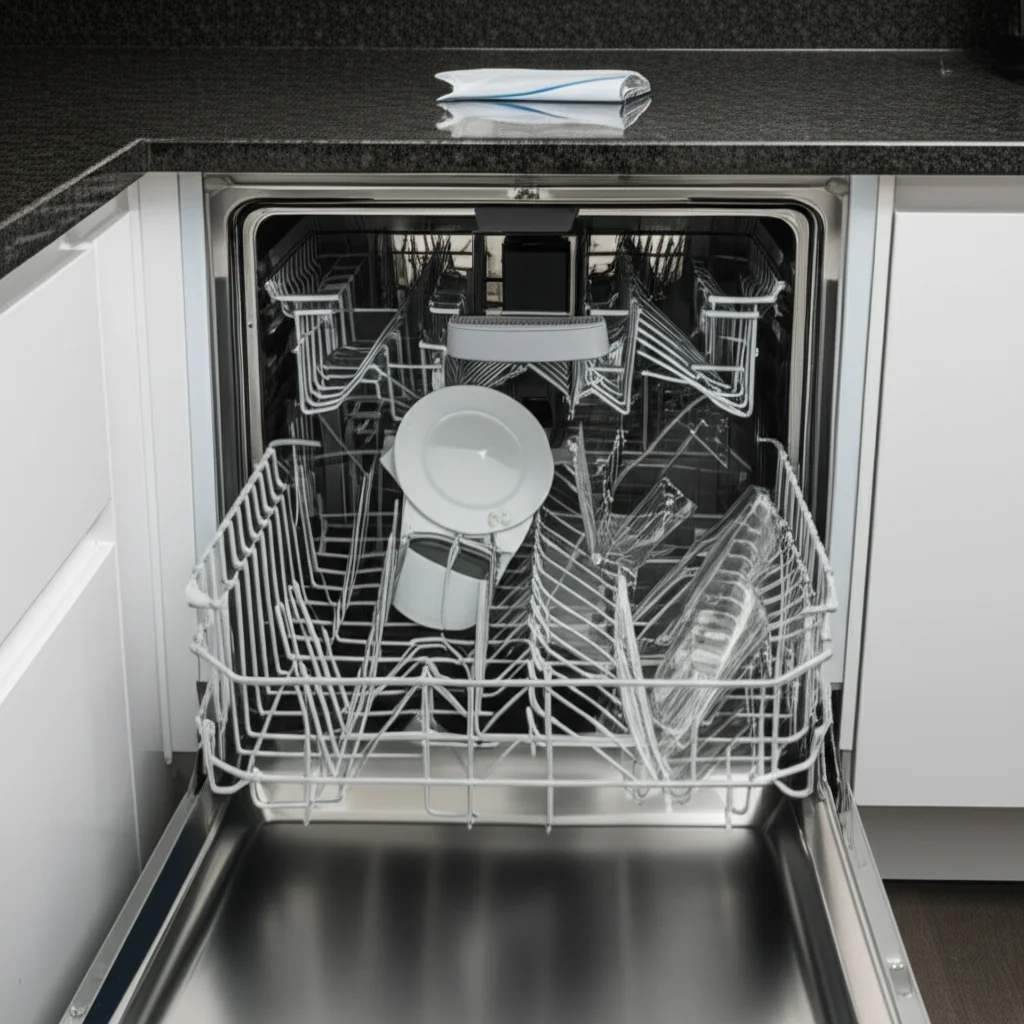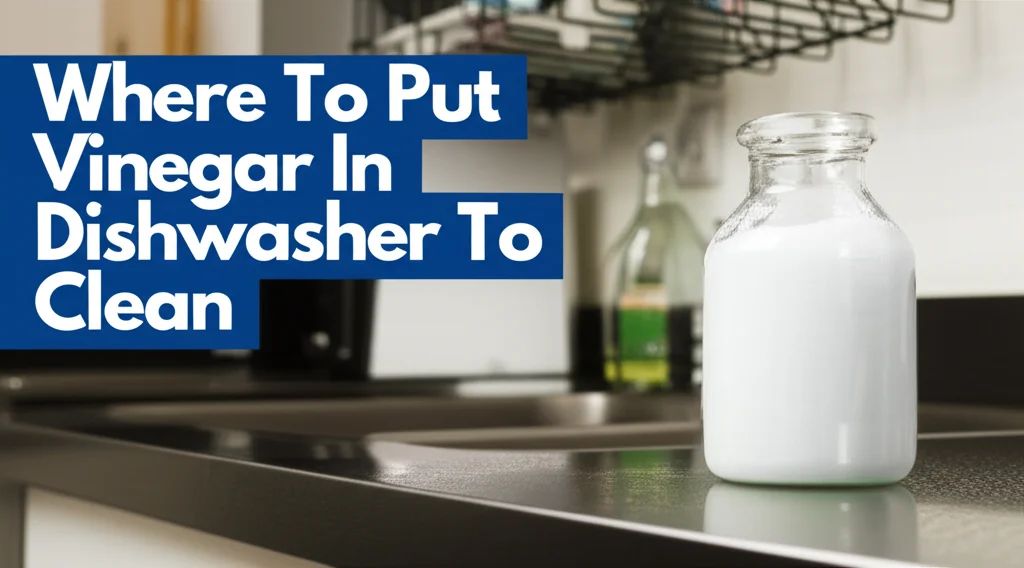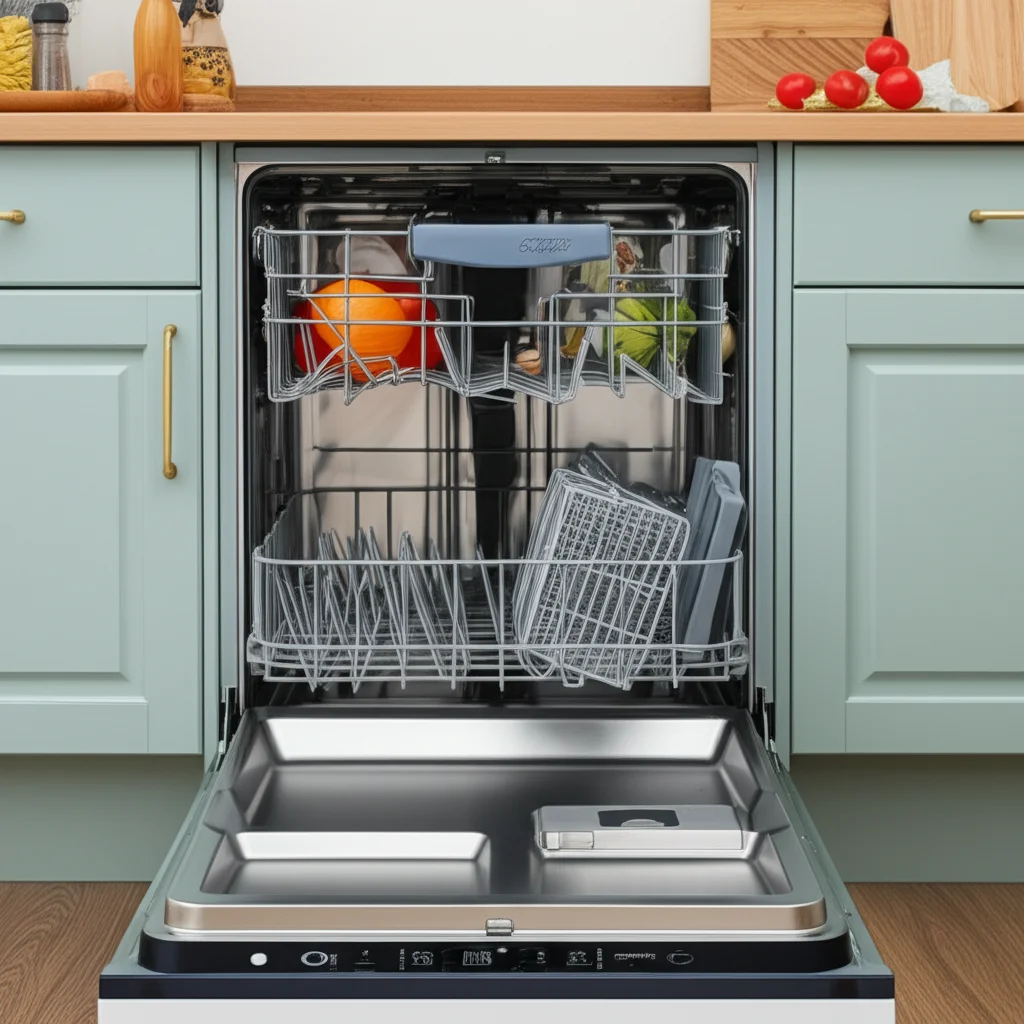· Todd Martin · Appliance Maintenance · 16 min read
How To Clean Black Stuff In Dishwasher

Eliminate Black Stuff from Your Dishwasher: A Complete Guide
Have you ever opened your dishwasher, expecting sparkling dishes, only to find an unsightly black residue? It can be quite alarming. This black stuff does not just look bad; it can also affect your dishwasher’s performance and even your family’s health. You want your dishes to come out clean, not covered in mystery gunk.
I understand how frustrating it is to see this grime. It signals that your dishwasher needs attention. Tackling this issue promptly ensures your appliance works efficiently. It also keeps your dishes truly clean. This guide will help you understand what causes the black buildup. We will explore simple, effective steps to remove it. We will also cover how to prevent it from returning. By the end, you will know exactly how to clean black stuff in your dishwasher, keeping it fresh and functional.
Takeaway:
- Identify the source of black stuff, often mold, mildew, or food debris.
- Clean your dishwasher thoroughly using a combination of vinegar, baking soda, or citric acid.
- Regularly maintain your appliance to prevent future black residue.
To effectively clean black stuff in your dishwasher, you must first identify its source—often mold, mildew, or food particles. Disassemble removable components like the filter and spray arms for direct cleaning. Then, use a hot cycle with white vinegar or a specialized cleaner to sanitize the interior, eliminating buildup and preventing recurrence.
What Causes Black Stuff in Your Dishwasher?
Understanding why black stuff appears in your dishwasher helps you clean it better. This unsightly grime is not just random dirt. It usually points to specific problems within your appliance. Identifying the cause helps you choose the right cleaning strategy.
One common culprit is mold or mildew. Dishwashers are dark, damp environments. This makes them ideal breeding grounds for these fungi. Food particles left on dishes can also contribute. These organic materials provide a food source for mold to grow. If you do not rinse dishes before loading them, tiny bits collect inside the machine.
Another reason can be hard water. Hard water contains minerals like calcium and magnesium. These minerals can combine with detergent residue. This mixture creates a dark, sticky film over time. This film often looks black or dark gray. It clings to the inside of the dishwasher. It reduces cleaning effectiveness.
Sometimes, the black stuff is simply old food debris. Over time, small bits of food can accumulate in crevices. They can get stuck in the filter or spray arm nozzles. This decaying food can turn dark. It can develop a foul odor. It definitely needs regular removal.
Even detergent can contribute. If you use too much detergent, or if your detergent does not dissolve properly, it can leave residue. This residue can trap dirt and food particles. Over time, this trapped grime turns black. This issue can often be fixed with better detergent choices or proper dosing.
Essential Tools and Cleaning Agents for a Sparkling Dishwasher
Before you start scrubbing, gather the right tools and cleaning agents. Having everything ready makes the cleaning process smooth and efficient. You do not need fancy equipment. Most items are likely already in your home.
You will need a few basic tools. A soft brush or an old toothbrush is great for scrubbing tight spots. A microfiber cloth or sponge works well for wiping surfaces. A small bowl or measuring cup can be useful for mixing solutions. I always keep a pair of rubber gloves handy. They protect my hands from cleaning agents and grime.
For cleaning agents, white distilled vinegar is a powerhouse. Its acidic nature helps dissolve mineral deposits and grime. It also acts as a natural disinfectant. Baking soda is another essential item. It neutralizes odors and provides a gentle abrasive action. Together, vinegar and baking soda form a powerful cleaning duo. You can learn more about how to clean your dishwasher with vinegar and baking soda on our site. how to clean dishwasher with vinegar and baking soda
Another effective option is citric acid. This natural cleaner is excellent for breaking down mineral deposits. It helps remove rust and hard water stains. You might find it in powder form. Using citric acid can leave your dishwasher sparkling clean. Explore how to clean your dishwasher with citric acid for detailed steps. how to clean dishwasher with citric acid
For stubborn mold or mildew, a mild bleach solution can be used, but with extreme caution. Bleach should never be mixed with vinegar or other acidic cleaners. This creates dangerous fumes. Always consult your dishwasher’s manual before using bleach. Only use it as a last resort for severe mold issues. Sometimes, a commercial dishwasher cleaner can also be effective. These products are formulated to tackle various buildups. They often come in tablet or liquid form.
Step-by-Step Guide to Cleaning Black Stuff from Your Dishwasher
Cleaning the black stuff from your dishwasher requires a systematic approach. Follow these steps for a thorough and effective clean. This process ensures you tackle all areas where grime can hide.
First, empty your dishwasher completely. Remove all dishes, racks, and utensil baskets. This gives you clear access to the interior. Check for any large food particles. Remove them by hand. You do not want them going down the drain.
Next, focus on the filter. Most dishwashers have a removable filter at the bottom. It traps food debris. Twist or unlatch it according to your appliance’s manual. Take the filter out. Rinse it under warm running water. Use a soft brush or old toothbrush to scrub away any stuck-on black gunk or food particles. I have seen filters completely caked with old food; cleaning this part is crucial.
Now, tackle the spray arms. These are the spinning components that spray water. They often have small holes that can get clogged. Check for any blockages. Use a toothpick or a thin wire to clear any debris from the holes. If the spray arms are removable, take them off. Rinse them thoroughly under warm water. Clean any black residue off the surface.
With the removable parts cleaned, it is time to clean the interior. Pay special attention to the door gasket and seal. Black mold or mildew often accumulates here. Use a damp cloth soaked in white vinegar or a mixture of baking soda and water. Wipe down the entire interior, focusing on these rubber seals. Scrub gently to remove the black film.
For a deeper clean, place a dishwasher-safe bowl filled with two cups of white vinegar on the top rack. Do not add any detergent. Run a hot water cycle. This vinegar wash helps dissolve mineral deposits and kill bacteria. It also removes foul odors. This is a powerful step in how to clean black stuff in your dishwasher.
After the vinegar cycle, sprinkle a cup of baking soda across the bottom of the dishwasher. Run another short hot water cycle. This second cycle helps absorb any remaining odors and provides additional scrubbing action. It leaves your dishwasher smelling fresh. This two-step cleaning method is very effective for persistent grime.
Targeting Specific Areas: Filter, Spray Arms, and Door Gasket
The black stuff in your dishwasher often concentrates in specific areas. Focusing on these high-grime zones ensures a complete clean. Each part plays a critical role in your dishwasher’s operation. Ignoring them means the problem will return quickly.
The dishwasher filter is a major culprit. It traps all the larger food particles. If not cleaned regularly, these particles decompose. They create a black, sludgy mess. This sludge can then breed mold and mildew. I recommend cleaning your filter at least once a month. To clean it, remove the filter assembly. Rinse it under hot running water. Use a soft brush or toothbrush to dislodge stubborn black debris. Sometimes, a soak in warm soapy water helps loosen hardened grime.
Next, inspect the spray arms. These rotating arms distribute water throughout the dishwasher. Their tiny holes can become clogged with mineral deposits or small food bits. When clogged, water distribution is uneven. This leaves dishes dirty. Black residue can also build up on the arms themselves. Carefully detach the spray arms if your model allows. Use a toothpick or small wire to clear each spray hole. Wipe down the entire arm with a damp cloth and vinegar solution. Ensure all holes are clear before reattaching.
The door gasket, or rubber seal around the dishwasher door, is a prime spot for mold and mildew. This area stays damp. It is often overlooked during regular cleaning. Black gunk here can transfer to your dishes. It can also cause unpleasant odors. Use a cloth dampened with a vinegar-water solution. Carefully wipe down all surfaces of the gasket. Pull back the folds of the rubber to clean underneath. A cotton swab can reach very tight spots. For persistent mold, a light scrub with an old toothbrush might be needed. Be gentle to avoid damaging the seal.
The drain area at the bottom of the dishwasher also needs attention. Standing water can lead to black buildup. After removing the filter, inspect the drain opening. Clear any visible debris. You can use a small amount of baking soda followed by hot water to help clear any minor blockages. For issues with black residue in other drains, consider looking at how to clean black stuff in sink drain for more specific guidance. how to clean black stuff in sink drain
Dealing with Persistent Black Stuff and Odors
Sometimes, the black stuff and associated odors are stubborn. Regular cleaning steps might not fully eliminate them. This requires a more intensive approach. Do not give up; persistence pays off for a truly clean machine.
If mold or mildew keeps appearing, consider using a stronger sanitizing agent. A small amount of dishwasher-safe bleach can be used, but never mix it with vinegar or other cleaners. Bleach can kill mold spores effectively. First, run an empty hot cycle to rinse out any existing detergents. Then, add about half a cup of bleach to the detergent dispenser. Run another hot cycle. This sanitizes the internal components. However, this method should be used sparingly. Always check your dishwasher’s manual to ensure it is safe for your model. If you are dealing with black mold in other areas, our guide on how to clean black mold off wood might offer similar insights on mold removal principles. how to clean black mold off wood
For lingering odors, it helps to identify the source. Often, it is decaying food particles trapped deep within the system. You might need to check the drain hose for blockages. Some dishwashers have a drain hose that connects to the sink drain. Disconnect it and inspect for any gunk. This might require some DIY skill. If you are unsure, consider professional help. A common source of black gunk and odor can also be found in other plumbing fixtures, like a faucet. You can find more about how to clean black gunk from faucet on our site. how to clean black gunk from faucet
Running regular hot water cycles with no dishes helps too. This flushes out residue that might cause odors. You can also try placing a bowl of activated charcoal inside the empty dishwasher overnight. Activated charcoal absorbs odors naturally. It does not introduce chemicals.
Another trick for persistent black stuff and odors involves a dishwasher cleaning tablet. These tablets are designed to deep clean the interior. They break down grease, grime, and mineral deposits. Place one tablet in the detergent dispenser. Run a hot, empty cycle. These can be very effective for a quick, powerful clean. Always follow the product instructions carefully.
If your dishwasher still smells bad or shows black buildup after these attempts, there might be a deeper issue. It could be a partially clogged drain line. It might be a failing heating element. These problems often require a professional appliance technician. Do not hesitate to call for expert help.
Preventative Measures to Keep Black Stuff Away
After thoroughly cleaning your dishwasher, the goal is to keep it free of black stuff. Prevention is far easier than intense cleaning. Implementing a few simple habits will maintain your appliance’s cleanliness.
First, always scrape off large food particles from dishes before loading them. You do not need to pre-rinse perfectly. However, removing solid debris prevents it from accumulating in the filter or drain. This reduces the organic matter that mold and mildew feed on. It also protects your dishwasher’s internal components.
Regularly clean your dishwasher filter. I find that cleaning it once a month is sufficient for most households. If you run your dishwasher daily or have hard water, you might need to clean it every two to three weeks. This prevents the buildup of food waste and black sludge. It is a simple step that makes a huge difference.
Leave the dishwasher door ajar after each cycle. This allows air to circulate. It helps the interior dry completely. A dry environment discourages mold and mildew growth. It prevents the damp conditions they thrive in. A quick wipe of the door gasket can also help remove any remaining moisture.
Use the right amount of detergent. Too much detergent can lead to residue buildup. Too little might not clean effectively, leaving food particles behind. Follow the detergent manufacturer’s recommendations. Adjust based on your water hardness. If you have hard water, consider using a rinse aid. Rinse aid helps water sheet off dishes. It also reduces mineral deposits on the dishwasher interior.
Run a maintenance cycle regularly. I recommend doing this once a month. Run an empty dishwasher on its hottest cycle. You can add a cup of white vinegar to a dishwasher-safe bowl on the top rack. Alternatively, use a dishwasher cleaning tablet. This helps flush out any mineral deposits or grease buildup. It keeps your appliance fresh. This proactive step helps prevent the accumulation of black stuff over time. It keeps your dishwasher performing its best.
When to Consider Professional Help for Your Dishwasher
While many black stuff issues can be resolved with DIY cleaning, there are times when professional help is needed. Recognizing these situations saves you time and prevents further damage. Do not hesitate to call an expert if the problem persists.
If you have tried all cleaning methods and the black stuff returns quickly, it might indicate a deeper problem. This could be a significant blockage in the drain line. It could be a pump issue. These problems can trap stagnant water or organic matter. This creates persistent black residue. A professional can diagnose and fix these complex mechanical issues.
Persistent foul odors, even after thorough cleaning, also suggest a professional inspection. A strong, sewage-like smell could mean a problem with your home’s plumbing connection to the dishwasher. The air gap or drain line might be incorrectly installed or severely clogged. These situations require specialized tools and expertise to resolve safely.
You should also call a professional if you suspect mold is growing in inaccessible areas. Mold can get into internal hoses or parts you cannot reach. This is especially true if you notice health issues. Exposure to certain types of mold can cause respiratory problems. Professionals have specialized equipment to inspect and clean these hidden spots. They can ensure all mold is eliminated safely.
If your dishwasher is not draining properly, that is a clear sign for professional help. Black stuff often accompanies drainage problems. A slow or incomplete drain leaves standing water. This promotes mold and bacterial growth. While some clogs are simple, many require advanced knowledge of appliance plumbing. An appliance repair technician can clear tough blockages and check for pump malfunctions.
Finally, if your dishwasher is old and constantly developing black stuff, it might be time for a replacement. Older models may not be as efficient. Their parts can wear down. This makes them more prone to buildup. A professional can advise if repairs are cost-effective or if investing in a new, more efficient model is a better long-term solution. They offer valuable insights into your appliance’s health.
Frequently Asked Questions About Cleaning Black Stuff in Dishwasher
What is the black slime in my dishwasher?
The black slime in your dishwasher is commonly mold or mildew, thriving in damp, dark environments. It can also be a combination of food particles, grease, and mineral deposits that have accumulated and turned dark over time. Regular cleaning helps prevent its growth and buildup inside the appliance.
Is black mold in dishwasher dangerous?
Yes, black mold in your dishwasher can be dangerous. Exposure to mold, especially certain types like black mold, can cause respiratory issues, allergic reactions, and other health problems. It is crucial to clean it promptly and thoroughly. Ensure proper ventilation during cleaning to minimize exposure risks.
How often should I clean my dishwasher to prevent black stuff?
You should clean your dishwasher at least once a month to prevent black stuff from forming. This includes running an empty hot cycle with vinegar or a dishwasher cleaner. Regularly cleaning the filter and wiping down the door gasket after each use also significantly helps in prevention.
Can I use bleach to clean black stuff in my dishwasher?
You can use bleach, but with extreme caution and never mixed with other cleaners like vinegar. Bleach effectively kills mold and sanitizes. Add about half a cup to the detergent dispenser and run an empty hot cycle. Always consult your dishwasher’s manual before using bleach.
Why does my dishwasher smell bad even after cleaning?
A persistent bad smell after cleaning often indicates hidden grime or a deeper plumbing issue. Check for trapped food in the drain hose or air gap. Odors can also come from stagnant water due to poor drainage. If odors persist, consider professional inspection of your dishwasher’s drainage system.
How do I prevent black stuff from coming back?
To prevent black stuff from returning, always scrape large food particles from dishes before loading. Clean your dishwasher filter regularly (monthly). Leave the dishwasher door ajar after cycles to allow air drying. Use the correct amount of detergent. Run a monthly maintenance cycle with vinegar or a cleaner.
Conclusion
Finding black stuff in your dishwasher is a common problem, but it is entirely fixable. We have covered the main reasons this happens, from mold and mildew to food residue and hard water deposits. You now have the knowledge and tools to tackle it head-on. By understanding the causes, you can approach the cleaning process with confidence.
Remember, a clean dishwasher not only looks better but also works more efficiently. Your dishes will come out truly sparkling. Regular maintenance, like cleaning the filter and running monthly cleaning cycles, is your best defense against this unsightly buildup. Keep an eye on those high-grime areas like the door gasket and spray arms.
If the black stuff in your dishwasher persists, or if you notice recurring foul odors, do not hesitate to seek professional help. Sometimes, a deeper issue requires an expert touch. By following these steps, you can keep your dishwasher clean, fresh, and functioning perfectly for years to come. Take action today and enjoy a healthier kitchen environment!
- dishwasher cleaning
- mold removal
- kitchen appliance care
- home maintenance
- black residue





